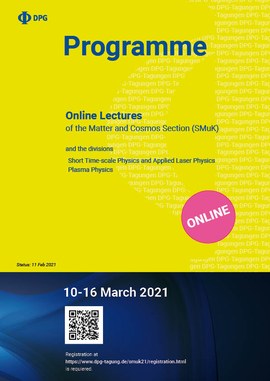Online lectures within the virtual DPG-Frühjahrstagungen (DPG Spring Meetings) 2021
Accompanying the virtual DPG-Frühjahrstagungen (DPG Spring Meetings) 2021, various associations of the DPG organised online lecture series. These were aimed in particular at young scientists and were offered free of charge.
The contributions were exclusively broadcast live and not recorded, which is why they cannot be called up again at a later date.
"Online lectures of the Matter and Cosmos Section"

This event offered three days (10.03.-12.03.2021) of highlight lectures in which the various divisions presented themselves with topics from current research. In addition, the participants had the opportunity - in "Meet the Speakers Sessions" - to have in-depth discussions with the invited speakers.
In the period 15.03.-16.03.2021, the symposium "Dark Matter" as well as a plenary lecture of the Dortmund conference were included in the event.
The lecture series was offered free of charge. There were no active conference contributions (short presentations/posters) by participants within the lecture series.
PROGRAMME
Wednesday, 10.03.2021, 09:00
"Heavy-ion physics, what have we learned with 10 years at the LHC" - Anton Andronic, WWU Münster
Wednesday, 10.03.2021, 10:00
"Origin of heavy elements: r-process in neutron star mergers and core-collapse supernovae" - Almudena Arcones, TU Darmstadt
Wednesday, 10.03.2021, 13:30
"Physics of the sun with Solar Orbiter" - Alexander Warmuth, Leibniz-Institut für Astrophysik, Potsdam
Wednesday, 10.03.2021, 14:30
"Observing the birthplaces of planets" - Cornelis Dullemond, Universität Heidelberg
Thursday, 11.03.2021, 09:00
"Molecular structures in hadron and nuclear physics" - Ulf-G. Meißner, Universität Bonn & Forschungszentrum Jülich
Thursday, 11.03.2021, 10:00
"Combining Atomic and Nuclear Physics in Ion Storage Rings" - Yury A. Litvinov, GSI
Thursday, 11.03.2021, 12:30
"Laser active fibres" - Michael Steinke, Universität Hannover
Thursday, 11.03.2021, 13:30
"Entanglement Entropy in Quantum Field Theory" - Ko Sanders, Dublin City University
Thursday, 11.03.2021, 14:30
"The AdS/CFT Duality – from strongly coupled quantum field theories to holographic spacetimes and back" - Martin Ammon, Universität Jena
Friday, 12.03.2021, 09:00
"The nature of the compact mass at the center of the Milky Way" - Andreas Eckart, Universität zu Köln
Friday, 12.03.2021, 10:00
"The binary universe in gravitational waves" - Frank Ohme, AEI Hannover
Friday, 12.03.2021, 13:30
"Turbulent Transport at Wendelstein 7-X" - Olaf Grulke, MPI für Plasmaphysik Garching
Friday, 12.03.2021, 14:30
"Transient atmospheric plasmas – mastering the non-equlibrium" - Achim von Keudell, Ruhr-Universität Bochum
Monday, 15.03.2021, 10:00
"New ideas on Dark Matter" - Björn Malte Schäfer, Universität Heidelberg
Monday, 15.03.2021, 10:50
"Producing on Earth the missing matter of the Universe" - Alexander Grohsjean, DESY
Monday, 15.03.2021, 11:40
"Detecting on Earth the missing matter of the Universe" - Federica Petricca, LMU München
Tuesday, 16.03.2021, 09:00
"Physics-informed AI for image reconstruction in PET" - Andrew Reader, King‘s College London
"Semiconductors for breakfast"
After the great success in 2020, "semiconductors for breakfast" went into the second round in 2021. In the period from 15.03.-26.03.2021, an exciting lecture on a current topic in semiconductor physics was presented every day.
The online lectures were held live via Zoom and were intended to appeal in particular to students and doctoral candidates. The lectures took place at breakfast time at 10:15, with the possibility to ask questions afterwards.
PROGRAMME
Monday, 15.03.2021, 10:15
"Light from Silicon" - Erik Bakkers, Eindhoven University of Technology
Tuesday, 16.03.2021, 10:15
"Semiconductor nanolasers" - Jesper Mørk, Technical University of Denmark
Wednesday, 17.03.2021, 10:15
"2D van-der-Waals materials: phonons and excitons" - Janina Maultzsch, FAU Erlangen Nürnberg
Thursday, 18.03.2021, 10:15
"Fighting germs with deep UV LEDs" - Michael Kneissl, TU Berlin
Friday, 19.03.2021, 10:15
"Brain-inspired computing with resistive memory" - Irem Boybat, IBM Research Europe
Monday, 22.03.2021, 10:15
"Buckling induced flat bands: giant nanoscale periodic strain" - Francois Peeters, University of Antwerp
Tuesday, 23.03.2021, 10:15
"NIR and MIR Lasers and their use in sensing applications" - Johannes Koeth, nanoplus Nanosystems and Technologies GmbH
Wednesday, 24.03.2021, 10:15
"Quantum Fluids of Interacting Photons" - Daniele Sanvitto, CNR Nanotec - Lecce
Thursday, 25.03.2021, 10:15
"Collective phenomena in a QD nuclear spin ensemble" - Claire LeGall, University of Cambridge
Friday, 26.03.2021, 10:15
"A quantum dot in a tunable microcavity as a fast and bright source of coherent single photons" - Richard Warburton, University of Basel